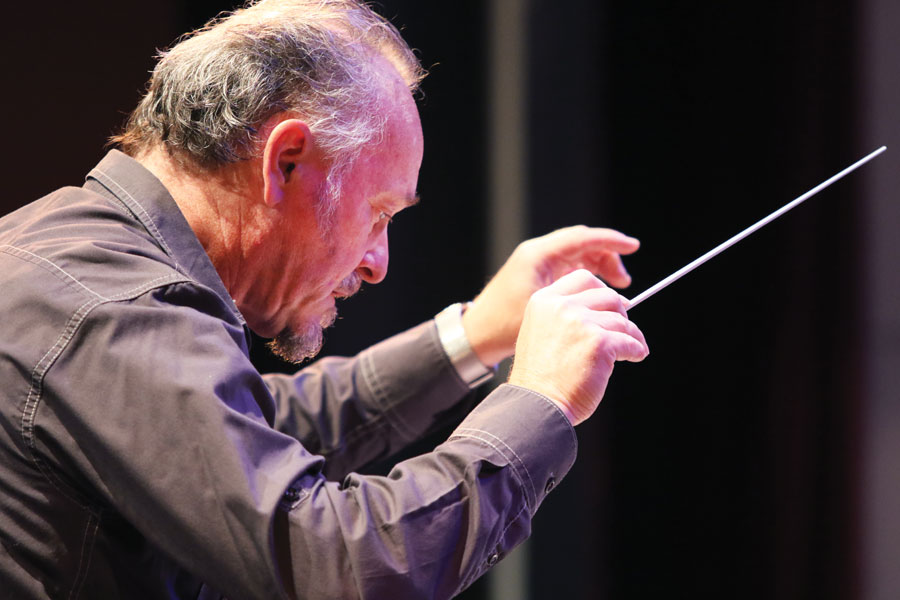John Zoltek calls the Glacier Symphony and Chorale his life’s work.
When he first became GSC’s music director during the 1996-1997 season, he didn’t intend to stay for more than a few years. He viewed it as the place that would jumpstart his career, not define it.
Twenty years later, he says, “This is my legacy.” There are multiple GSC programs and initiatives to which he could be referring, but one is surely Festival Amadeus, Montana’s only week-long summer festival dedicated to classical music. Established in 2008, Zoltek is its creator and founding music director and conducts its performances.
This summer marks the festival’s 10-year anniversary, and the significance of the occasion is not lost either on Zoltek or the featured artists, who will be traveling from all over the U.S. to perform in the festival’s Whitefish- and Bigfork-based concerts running Aug. 8-13.
Pianist Tanya Gabrielan, of New York City, and Boston-based violinist Yevgeny Kutik will both perform for the second time at Festival Amadeus. The Fry Street Quartet, made up of first violinist Robert Waters, second violinist Rebecca McFaul, violist Bradley Ottesen, and cellist Anne Francis Bayless, will drive up from Logan, Utah for their fifth consecutive appearance.
Each year, the quartet works with chamber orchestra students in North Valley Music School’s Camp Festival Amadeus, sharing stories of their musical journeys, helping participants to embark on their own, and further forging enduring connections with the community.
“We’ve also performed at several concerts at a church in Bigfork,” McFaul says, “and afterwards members of the audience have come up and we’ve had very involved conversations about the music.”
For McFaul, these conversations are both rewarding and refreshing.
“I can’t tell you how many people have approached me after other performances and have felt compelled to preface their comments with, ‘I don’t know anything about music,’” she says.
In McFaul’s view, part of the quartet’s mission is to make the “rarefied world” of classical music more accessible. This is a skill that the members learned during their three-year Rural Residency in Hickory, North Carolina early in their careers.
“We basically were told, ‘Make this community care about your art,” McFaul says. “We learned how to play for everybody. We didn’t just sit and wait for the audience to come to us. We went to them. We held short pre-concert presentations to demystify the rituals that make people think they can’t understand classical music.”
Zoltek similarly makes this a focal point during Festival Amadeus and GSC performances.
“Before the concerts, the musicians talk to the audience, I talk to the audience,” he says.
“The work done by Festival Amadeus to make classical music more accessible is very important,” says Kutik, the Boston violinist. “In my mind, it’s one of the most important things I can do as a classical musician.”
McFaul adds, “It’s hard to overestimate the effect Festival Amadeus has on the community. It’s become part of Montana’s cultural fabric — and that doesn’t just happen. It’s a result of a lot of dedicated boots on the ground.”
Zoltek also uses a shoe metaphor to describe the relationship between classical music and the community.
“Selling classical music is not quite the same thing as selling shoes,” he says. “But I’m not living in a fantasy world. People here do want to hear classical music.”
Zoltek may not live in a fantasy world, but he’s bringing one to the stage via Festival Amadeus’ first-ever opera performance.
The last two nights of the festival, Aug. 12 and 13, will be dedicated to The Magic Flute, Mozart’s final and most elliptic opera, which is known for its simplistic fairy-tale plot that masks deeper allegorical meaning. Zoltek’s decision to add an opera to Festival Amadeus’ program is at once celebratory and experimental.
“Mozart is one of the greatest opera composers in music history,” he says, “and the 10th anniversary is a great time to celebrate that.”
But it’s also a way for Zoltek to “eschew old-world formality” and present a more modern interpretation of the opera, which was first performed in 1791.
The opera will be visually enhanced with a projected compilation of heavily edited, colorized nature photos by Daniel Williams in order to create what Zoltek calls “fantasy spaces” that reflect, albeit abstractly, the opera’s otherworldly environment.
“It’s a combination of high art with something more popular, more immediate,” he says. “It’s visceral and psychedelic.”
Part of Zoltek’s artistic rationale for this is to cultivate a non-traditional opera experience. But it’s also intended as a tribute to the Montana landscape.
“All of the great composers, whether directly or conceptually, were inspired by nature,” Zoltek says. “Places like New York, they have their own ethos and energy, which result in an urban art form. But I believe the openness and beauty of Montana really lend themselves to classical music.”
He continues, “So what we’re doing here has a deep connection to where we live.”
The relationship between music and the natural world is not lost on McFaul, who says that at a time when the environment, glaciers and national parks are under threat more than ever, “Art and culture can be a way to get us in a room together and see what we can do about it.”
“Music isn’t just an isolated beautiful thing,” Kutik adds. “It’s a reflection of us, of humanity, at a particular moment in time.”
In this way, for Zoltek, incorporating an opera into Festival Amadeus isn’t just a logistical and musical challenge.
“It will also, I hope, challenge the audience,” he says.
For more information about Festival Amadeus and to purchase tickets, visit www.gscmusic.org/festival-amadeus/ or call (406) 407-7000.
